Rocket Languages

Summary
In the past, Rocket Chinese was among the worst online language courses I’d tried. Fortunately, they’ve made massive improvements to their course and have improved on a lot of their weaknesses. So, you can try it and see if you like it, but I think there are better online Chinese courses.
Pretty detailed lessons with lots of practice opportunities.
Covers most parts of the language, but some of it isn’t done particularly well.
Your money wold be better spent elsewhere in my opinion.
I Like
- The audio lessons balance language explanations with activities that require engagement.
- There are lots of opportunities to practice what you’ve learned.
I Don’t Like
- The exercises get extremely repetitive and don’t always focus on the most important information.
- Other courses do a better job of teaching Chinese.
- Sometimes the lessons don’t seem to be very well planned out.
Price
Rocket Chinese costs $99.95 for level 1, $249.90 for levels 2 and 3, $259.90 for levels 1, 2, and 3.
When I first tried Rocket Chinese, it was easily one of the worst courses I had ever come across. I gave it less than 1 out of 5 stars, one of the lowest scores this site has ever seen.
My complaints at the time were…
- The app was buggy and crashed constantly.
- A lot of lessons involved mimicking a foreign host with terrible pronunciation.
- Lesson structure and order was poorly thought out.
- A lack of explanations for a lot of aspects.
- And more…
Surprisingly, nearly all of my complaints have been addressed and fixed. The new version is magnitudes better than the one I originally tried.
However, because the original version was so terrible, even these huge improvements aren’t enough for me to recommend Rocket Chinese.
That said, I won’t go out of my way to dissuade people from using it. If you really like their trial lessons and want to give it a go, you’ll certainly make progress. It’s just that there are other courses that I prefer.
So, let’s get into the review.
First off, this is only my opinion, and it’s only based on one afternoon using the free trial. I think it was more than enough time to get a general idea of what their lessons are like.
Audio Lessons

The lesson audio averages around 25-30 minutes. This is basically a dialogue that the hosts discuss together. They leave lots of long pauses so that you can repeat after them.
Explanations are given in English by a foreign presenter. He was originally also speaking Chinese, but they’ve since re-recorded the course with a second native speaker in his place. This is a massive improvement as you can now model your speech after correct pronunciation.
Given how much of the lesson they leave as pauses for you to repeat, it seems like their focus would be on pronunciation.
But, at least in the lessons I found, they don’t give you much help at all in learning to pronounce the sounds that are unique to Chinese. This is an area that I think could still be improved upon.
For adults learning Chinese, it’s worth spending extra time learning pronunciation early on. If you just read pinyin as if it were English, you’ll make a lot of mistakes. I personally really like Chinese For Us — their pronunciation course is fantastically thorough.
The audio lessons are generally pretty solid. They’re not the most thrilling things around, but most courses won’t be terribly exciting either. They do try to make quite a few jokes, but at least for me, these end up feeling more awkward than anything else.
There’s also a Rocket Review section, in which you’ll be prompted to answer various questions before being given the correct answer.
Exercises
After each audio lesson, there are a variety of exercises for you to complete. First up is Play It!.
In this exercise, you’ll have a conversation with your computer, using the dialogue from the lesson. You can choose to act as either host or simply record yourself saying the sentences if you prefer.
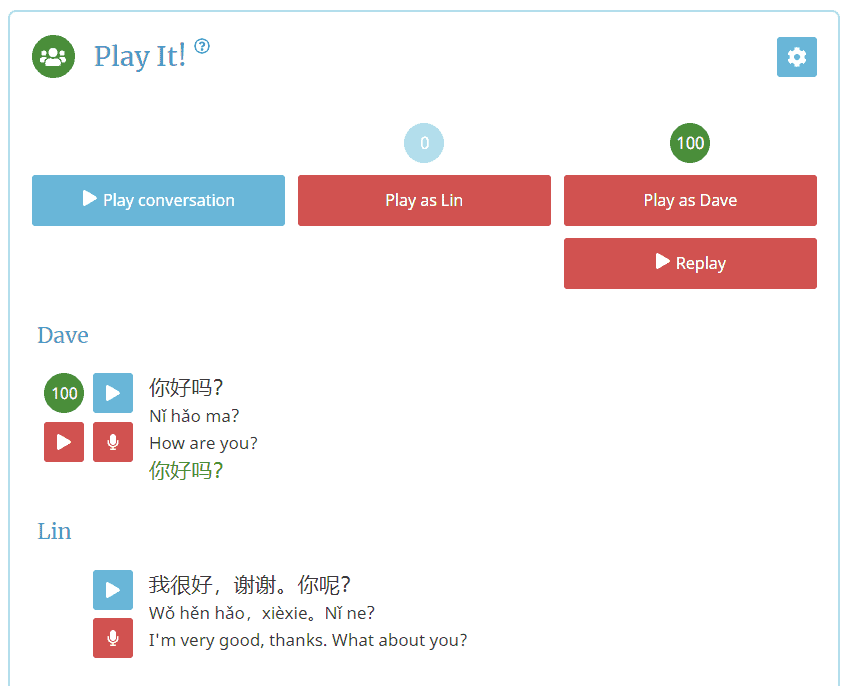
There’s also voice recognition software that will grade the accuracy of your speech.
It works okay-ish but I would strongly avoid relying on this to gauge your pronunciation. In its defense, it did detect when I said random syllables instead of the correct sentence. But, I could still say things in the strangest of tones and sounds and be marked correct.
I think it’s definitely worthwhile to practice speaking and recording yourself, just don’t worry too much about the scores given. This isn’t an issue unique to Rocket Chinese; every speech recognition software I’ve seen has the same limitations.
Following this section, you’ll see all the vocabulary that was used in the dialogue, and again you can listen and record yourself.
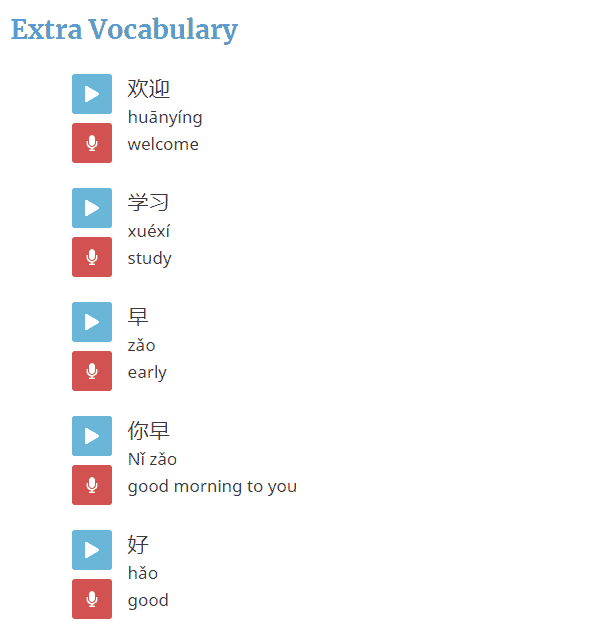
Rocket Reinforcement
Throughout all of the lessons, you’ll find these Rocket Reinforcement exercises. While they’re helpful for remembering what you’ve learned, they do get extremely repetitive.
The first of these exercises is called Flashcards. These are pretty unimpressive as it’s just translating a word and flipping the card to see if you’re correct.
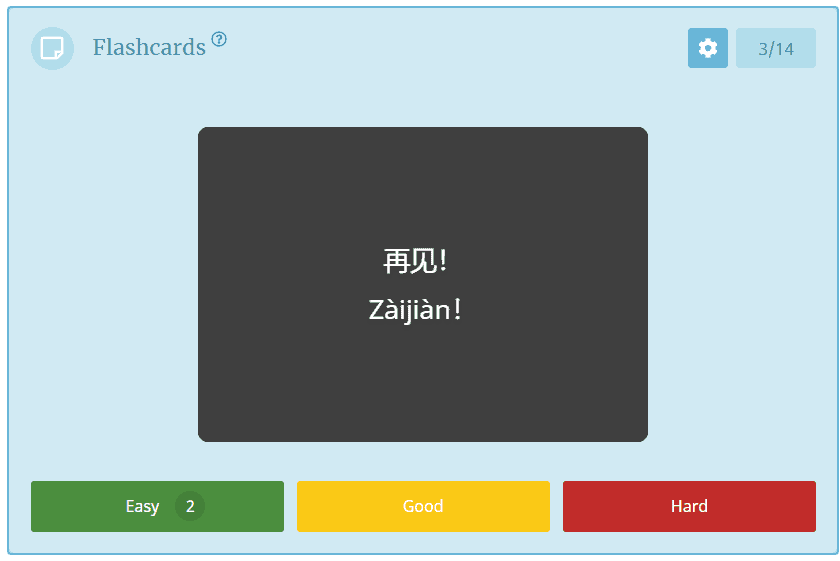
Then you’ll come across an activity called Hear It Say It!. You’re supposed to record your voice and compare it to the audio recording.
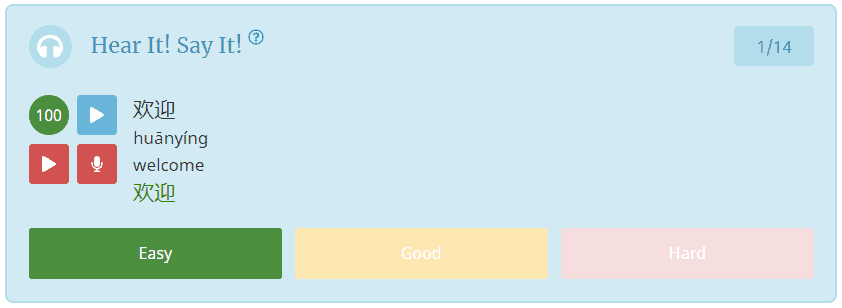
Up next is the Know It! exercise. Here, you read a word or phrase in English and record yourself saying it in Chinese.
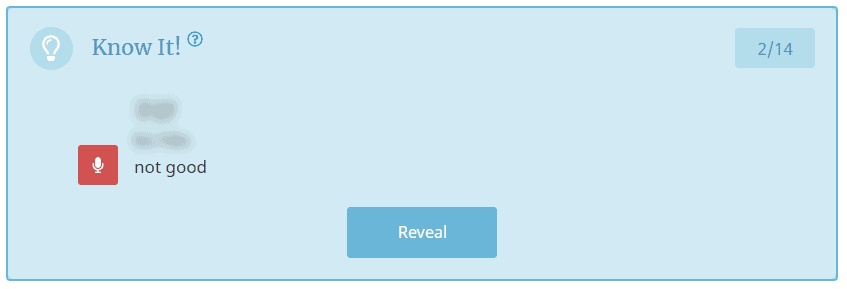

The last section is titled Extra Testing, and it’s where you’ll find the Write It! and Sort It! exercises. There are both pinyin and hanzi variations of the exercise.
Fortunately, they’ve updated the method for inputting Pinyin. There’s no Write It! activity for writing Chinese characters.
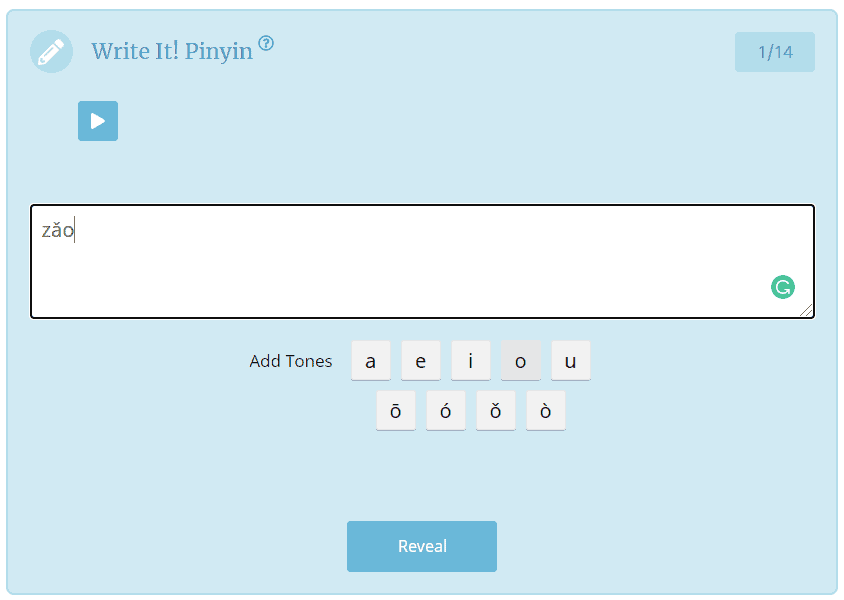
The other exercise in this section is Sort It!
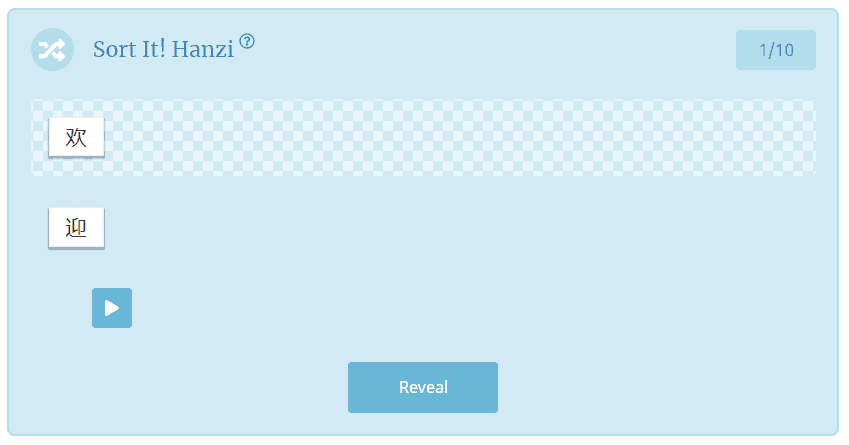
In this one, you’ll listen to a word or phrase and then put the character blocks in the correct order. It’s an okay way to practice your reading and listening skills, but you’ll need to use supplementary study tools to really learn to read Chinese well.
The Language and Culture lessons are much improved
The language and culture lessons are pretty solid. The first part of them covers some aspect of the language, appropriate to the level they’re at. These are text-heavy lessons with a lot of explanations and examples. It’s nice that throughout the lessons, you’ll be able to listen to examples and record yourself.
These lessons are insanely better than when I first tried Rocket Chinese, and they really aren’t bad by any means. Still, I think other courses like Yoyo Chinese or Chinese For Us are just better as they explain things more clearly and with more depth.
I also get the impression that Rocket Chinese has some random gaps where things aren’t necessarily explained as well as they should be and you may find yourself practicing less than useful stuff, such as the Chinese word for morpheme.
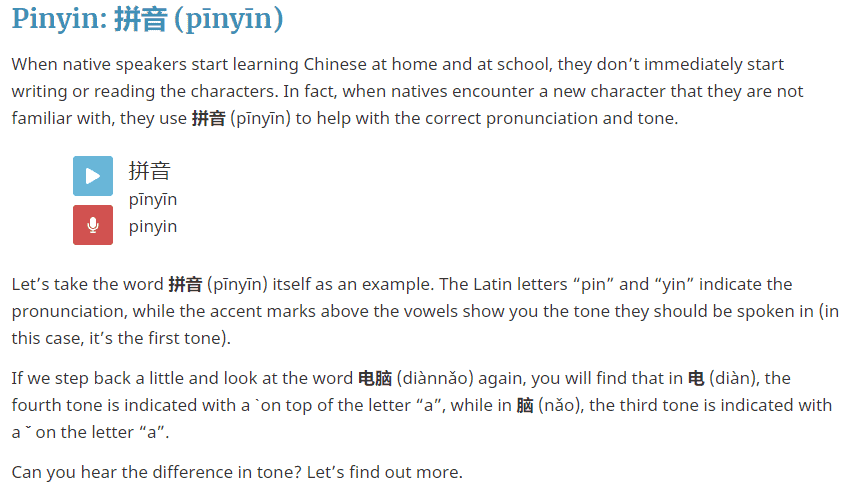
The Culture lessons are also much better than before. Now they’re a lot more detailed and cover more interesting topics. They’re pretty interesting to read, and again, there are opportunities to listen to and practice speaking what was covered in the lessons.
At the end of the Language and Culture lessons, you’ll have the Rocket Reinforcement exercises again. These can really get very repetitive and make it feel like you’re studying through brute force. Making matters worse, much of what you’ll be repeating over and over again isn’t anything you’ll need to know.
Beginners don’t need to remember the word for tulips, dolphins, or the technical name for personal pronouns.
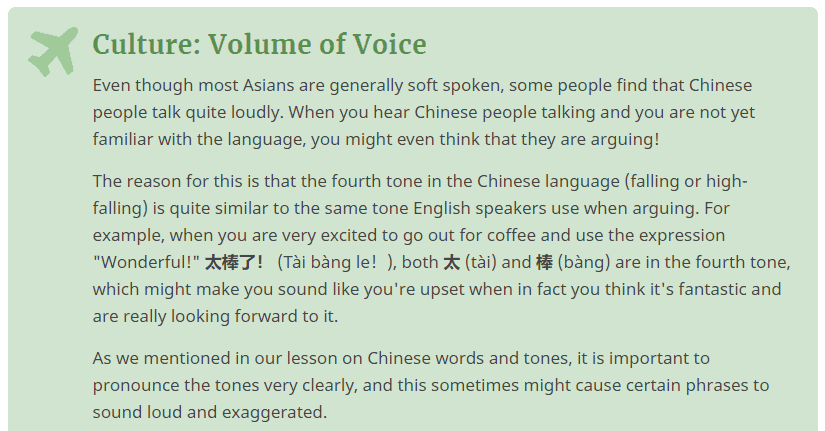
The Writing Lessons are also much better but still not great
The third type of lessons you’ll find on Rocket Chinese is their writing lesson. Like most parts of the course, this too has improved significantly from when I first tried the platform.
The problem is that they were so terrible before that even these massive improvements still only make them so-so in my opinion. There’s more explanation of how the characters work, along with a short video clip showing how they’re drawn, and some images showing the evolution of the character.
However, I don’t think Rocket Chinese could give you a comprehensive understanding of how Chinese characters work. A course that I would highly recommend for this is that by Outlier Linguistics and if you really want to learn to write characters, then Skritter is definitely worth the money.
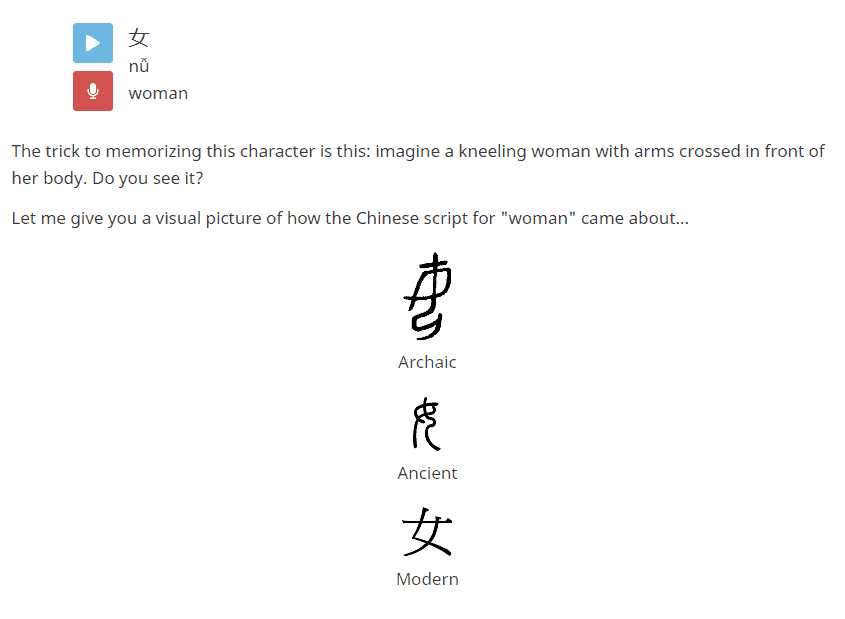
Even though Rocket Chinese has improved this area of their program, I’d still much rather use other resources.
Another oddity is that among the first eight characters you learn how to write are 凹 (ao1) and 凸 (tu1). These characters aren’t particularly common and it makes no sense to include them in one of the first writing lessons.
I looked them up on Hanzicraft and found the frequency for both characters to be around 2856 of 9933 characters. There are plenty of characters worth spending the time to learn to write, but for beginner students to learn to write these characters is a complete waste of time.
This gives the impression that not much thought went into deciding how best to structure these lessons.
Rocket Chinese has improved significantly, but I still wouldn’t recommend it.
I’m really happy to see that Rocket Chinese has taken big steps towards improving their courses — the results show. Since updating the Chinese course, it’s become a significantly better product.
But, I still wouldn’t use it.
Even after all of these changes, I wouldn’t exactly consider it a good course. I wouldn’t consider it a bad one either. Instead, it just lies somewhere in the middle.
So, I still wouldn’t recommend Rocket Chinese as there are better online Chinese coursesto choose from. But, at least now, I feel like they’re actually trying to create a good product and not just make a quick buck.


Thanks for the heads up. That’s good to hear that they switched out the British guy and made some other changes.
You may want to revisit it. They have changed the structure a bit, and the best fix is they’ve removed the British man from the actual conversations and replaced him with a native Chinese male.
Rocket Languages may work reasonably well in some other languages – the French one isn’t too bad …… but the Chinese programme leaves a great deal to be desired. Certainly not worth the money they are asking for.
Thanks! Very helpful review/post.